Opportunity Card Germany
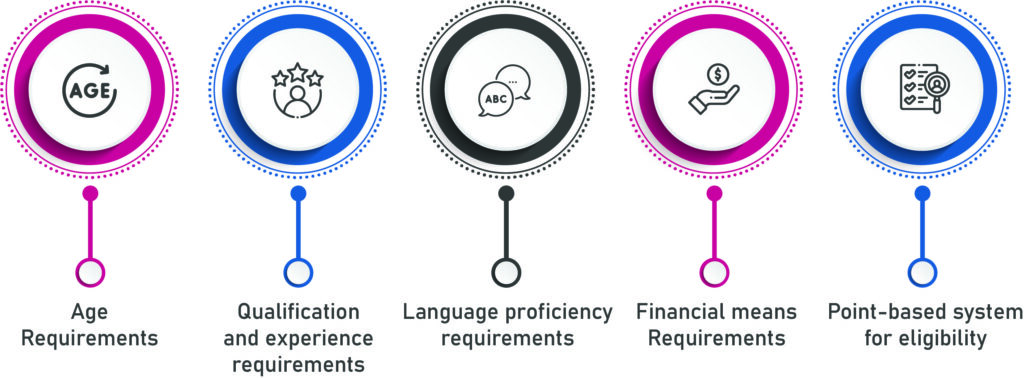
Opportunity Card Germany How to Apply?
Wondering how to apply for opportunity card in Germany? Meet the eligibility criteria for the Opportunity Card. You can apply for opportunity card Germany at the relevant German Mission abroad in your country of origin or apply to the relevant local Foreigners’ Registration Office if you are already in Germany. The application process for the Opportunity Card is as follows:
- Gather the required documents: You will need to provide various documents, including a valid passport, a recent biometric passport photo, proof of qualifications, proof of work experience, proof of language proficiency, and proof of financial means.
- Fill out the application form: You can obtain the application form from the German mission abroad or the local Foreigners’ Registration Office. Fill out the form completely and accurately.
- Submit the application: Submit the application form and the required documents to the relevant German mission abroad or the local Foreigners’ Registration Office. You may also need to pay a fee for the application.
- Wait for processing: The processing time for the Opportunity Card application can vary depending on the workload of the relevant German mission abroad or the local Foreigners’ Registration Office. It can take several weeks to several months to process the German opportunity card application.
- Receive the Opportunity Card: If your application is approved, you will receive the Opportunity Card. The Germany Opportunity Card is initially valid for one year, and it can be extended for up to two years if the person has an employment contract or a binding job offer for a qualified job in Germany and the German authorities have approved it.
To apply for the Opportunity Card in Germany, you need to gather the required documents, fill out the application form, apply, wait for processing, and receive the Opportunity Card if your German opportunity card application is approved. The processing time for the Opportunity Card application can vary, and the Chancenkarte is initially valid for one year, and it can be extended for up to two years.
Once you have received the Germany opportunity card, you can start looking for work in Germany. The opportunity Card in Germany allows you to work for your German employer without the need for additional work permits. Unlike other permits, the Germany opportunity card does not have a tie-up with a specific employer, providing flexibility in the job market. The Germany opportunity card is initially valid for one year, and it can be extended for up to two years if the person has an employment contract or a binding job offer for a qualified job in Germany and the German authorities have approved it.

Eligibility Criteria for the Germany Opportunity Card
To be eligible for the Opportunity Card in Germany, applicants must meet certain criteria, including age, qualifications, work experience, German language proficiency, and financial means. The Opportunity Card is based on a point system that awards points based on various criteria. Applicants must score at least 6 points out of a total of 14 points based on their age, qualifications, professional skills, and language skills to qualify for the Chancenkarte. The eligibility criteria for the Opportunity Card are as follows:
- Age requirements: The applicant should be under 35 years old to be eligible for the Germany Opportunity Card. If the applicant is between 35 and 40 years old, they can still be eligible for the card but will receive fewer points.
- Qualifications and experience requirements: The applicant should have a university degree or a vocational school qualification. The applicant should also have at least three years of relevant professional experience.
- Language proficiency requirements: The applicant should have either German language proficiency or previous residency in Germany.
- Financial means requirements: The applicant should have sufficient financial means to support themselves during their stay in Germany.
- Point-based system for eligibility: The applicant must score at least 6 points based on their age, qualifications, professional skills, and language skills.
What are the Benefits of the Opportunity Card Germany?
The Opportunity Card offers several compelling benefits for international workers who wish to make Germany their new home. Some of the benefits of the Opportunity Card are:
- Longer stay duration: The Opportunity Card allows eligible applicants to move to Germany for up to one year, even if they don’t have a job offer yet. They will be able to look for work on-site, take part-time jobs or trial positions, and get their qualifications recognized in Germany.
- Part-time work opportunities: Holders of the opportunity Card in Germany can work for their German employer without the need for additional work permits. Unlike other permits, the Opportunity Card does not have a tie-up with a specific employer, providing flexibility in the job market.
- Flexibility: The opportunity card in Germany allows for unrestricted travel within the Schengen Area, opening the door to exploring numerous European countries during your stay in Germany.
- Language training: The Opportunity Card offers opportunities for language learning, which is essential for job opportunities in Germany.
- Job placement assistance: The Opportunity Card provides job placement assistance to eligible applicants.
- Family-friendliness: Spouses and children of Opportunity Card holders can join them in Germany and obtain their residence permits.
- Cultural integration support: Opportunity Cardholders get the same social benefits as German citizens, including healthcare, unemployment benefits, and parental leave.
A Chancenkarte offers several benefits for international workers who wish to make Germany their new home. The Opportunity Card allows for longer stay duration, part-time work opportunities, flexibility, language training, job placement assistance, family-friendliness, and cultural integration support.
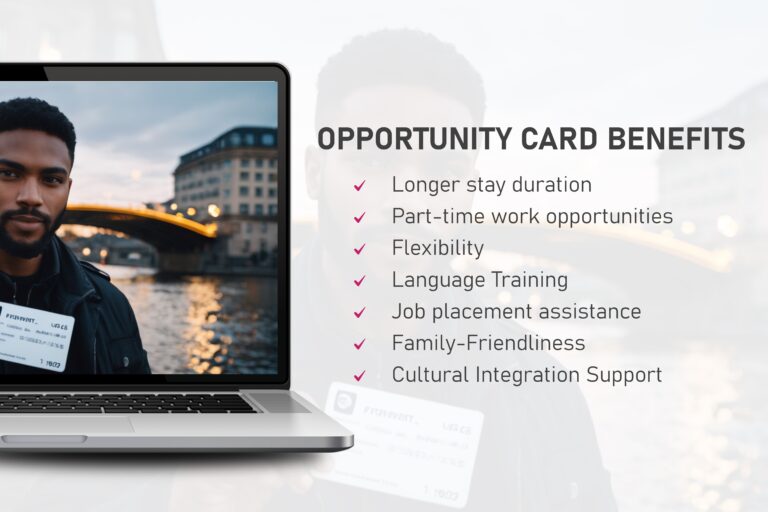
Opportunity Card – differences to other visas
Primary Differences between the Opportunity Card in Germany and the Job Seeker Visa
The Germany opportunity card and the Job Seeker Visa are two different types of visas in Germany. The primary differences between the Opportunity Card and the Job Seeker Visa are:
- Purpose of each visa: The Germany Opportunity Card is designed to attract skilled workers from non-EU countries to Germany, while the Job Seeker Visa is focused on seeking employment opportunities in Germany.
- Eligibility criteria: The eligibility criteria for the opportunity Card in Germany are based on a point system, while the eligibility criteria for the Job Seeker Visa are based on qualifications and work experience.
- Stay duration: The Opportunity Card allows eligible applicants to move to Germany for up to one year, while the Job Seeker Visa allows eligible applicants to stay in Germany for up to six months.
- Work opportunities: The Opportunity Card allows holders to work for their German employer without the need for additional work permits, while the Job Seeker Visa does not allow holders to work in Germany.
In summary, the Opportunity Card and the Job Seeker Visa are two different types of visas in Germany. The Opportunity Card is designed to attract skilled workers from non-EU countries to Germany, while the Job Seeker Visa is focused on seeking employment opportunities in Germany. The eligibility criteria, stay duration, and work opportunities differ between the two visas.
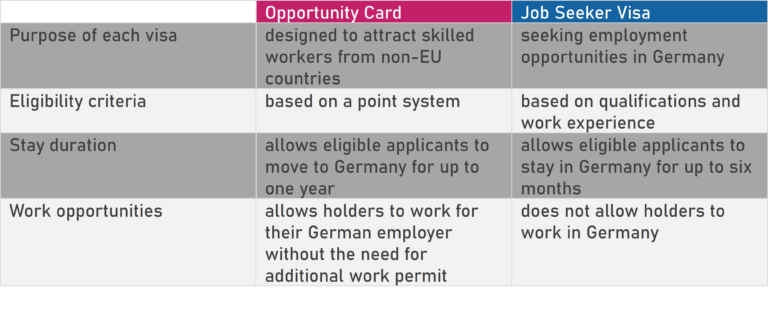
Does the job seeker visa have any advantages over the opportunity card?
Based on the search results, the Job Seeker Visa in Germany still has some advantages over the opportunity Card in Germany. Here are some of the advantages of the Job Seeker Visa:
- The Job Seeker Visa is focused on seeking employment opportunities and has a shorter stay duration of up to six months, which may be suitable for those who want to explore employment opportunities in Germany for a shorter period.
- The Job Seeker Visa does not require a local employer to sponsor the visa, which may be beneficial for those who want to explore job opportunities independently.
- The Job Seeker Visa does not require a minimum point score, which may be beneficial for those who do not meet the eligibility criteria for the Germany opportunity card.
- The Job Seeker Visa may be a more straightforward and less complex option for those who want to explore job opportunities in Germany.

Opportunity card Germany versus EU Blue Card
The Germany opportunity card and the Blue Card are two different types of visas in Germany. The Blue Card is a work and residence permit issued to highly skilled individuals, allowing them to work in professions where there is a shortage. The Opportunity Card, on the other hand, is designed to attract skilled workers from non-EU countries to Germany. Here are the differences between the Germany opportunity card and the Blue Card:
- Eligibility criteria: The eligibility criteria for the Blue Card are more stringent than those for the Opportunity Card. The Blue Card requires a university degree or a vocational school qualification, and a job offer with a minimum salary threshold of €56,800 per year (as of 2021). The opportunity Card in Germany, on the other hand, requires a university degree or a vocational school qualification, at least three years of relevant professional experience, and a minimum of six points based on a point-based system.
- Stay duration: The Blue Card allows the holder to work and live in Germany for up to four years, and it can be extended for another four years. The opportunity Card Germany, on the other hand, is initially valid for one year, and it can be extended for up to two years.
- Work opportunities: The Blue Card allows the holder to work in professions where there is a shortage, while the Opportunity Card allows the holder to work for their German employer without the need for additional work permits.
Blue Card and the Chancenkarte are two different types of visas in Germany. The Blue Card is a work and residence permit issued to highly skilled individuals, while the Chancenkarte is designed to attract skilled workers from non-EU countries to Germany. The eligibility criteria, stay duration, and work opportunities differ between the two visas.
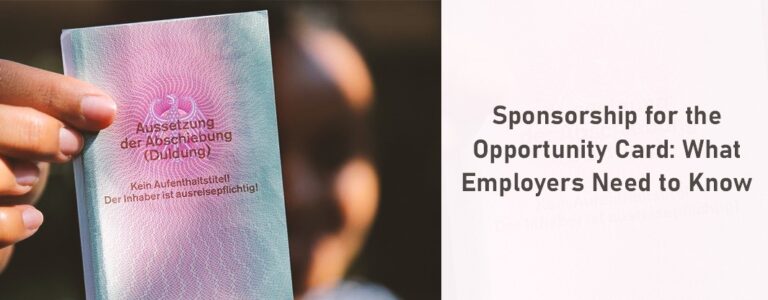
Sponsorship for the Opportunity Card: What Employers Need to Know
If you’re an employer in Germany looking to attract skilled workers from non-EU countries, sponsoring an Opportunity Card could be a great option. In this article, we’ll answer the most frequently asked questions about sponsoring an Opportunity Card in Germany.
- What it means for an employer to sponsor the Opportunity Card?
Sponsoring an Opportunity Card means that an employer is offering a job to a skilled worker from a non-EU country and is willing to support their Opportunity Card Germany application.
- Requirements for an employer to sponsor the opportunity card Germany?
To sponsor an Opportunity Card, an employer must provide a job offer, pay the required salary, and ensure that the employee has health insurance. The job must be a full-time, permanent position, and the employer must be registered with the German authorities.
- Responsibilities of an employer when sponsoring the Germany opportunity Card?
The responsibilities of an employer when sponsoring a Chancenkarte include providing a job offer, paying the required salary, and ensuring that the employee has health insurance. The employer must also ensure that the employee is working in the position for which they were hired and that they are not being exploited.
- Costs associated with sponsoring the Opportunity Card?
The costs associated with sponsoring an Opportunity Card include the salary of the employee, the cost of health insurance, and any fees associated with the Opportunity Card Germany application process. The exact costs will depend on the individual circumstances of the employer and the employee.
- How to sponsor an Opportunity Card?
To sponsor an Opportunity Card, an employer must provide a job offer to a skilled worker from a non-EU country and support their application for an Opportunity Card. The employer must ensure that the job is a full-time, permanent position, and that they are registered with the German authorities.
- What are the benefits of sponsoring an Opportunity Card?
Sponsoring an Opportunity Card can help employers attract skilled workers from non-EU countries and fill positions that are difficult to fill with local talent. It can also help employers build a diverse workforce and improve their reputation as an employer.
- What are the drawbacks of sponsoring an Opportunity Card?
The drawbacks of sponsoring an Opportunity Card are that it can be a time-consuming and expensive process, and there is no guarantee that the employee will be successful in obtaining an Opportunity Card.
- What are the responsibilities of an employer after sponsoring an Opportunity Card?
After sponsoring an Opportunity Card, the employer must ensure that the employee is working in the position for which they were hired and that they are not being exploited. The employer must also ensure that the employee has health insurance and is paid the required salary.
- What are the requirements for an employee to be sponsored for an Opportunity Card?
To be sponsored for an Opportunity Card, an employee must have a university degree or vocational school qualification, at least three years of relevant professional experience, and score at least six points based on a point-based system.
- How long does the Opportunity Card sponsorship process take?
The Opportunity Card sponsorship process can take several weeks to several months, depending on the workload of the German authorities and the individual circumstances of the employer and the employee.
- Can an employer sponsor multiple employees for Opportunity Cards?
Yes, an employer can sponsor multiple employees for Opportunity Cards, as long as they meet the eligibility criteria and the employer can provide the required support.
- What are the consequences of not fulfilling the responsibilities of an Opportunity Card sponsor?
If an employer does not fulfill their responsibilities as an Opportunity Card sponsor, they may face legal consequences and may be barred from sponsoring employees in the future.
- Can an employee switch employers after being sponsored for an Opportunity Card?
Yes, an employee can switch employers after being sponsored for an Opportunity Card, as long as the new employer is willing to support them for their new Opportunity Card Germany application.
- What are the language requirements for an employee-sponsored Opportunity Card?
An employee-sponsored for an Opportunity Card must prove that they speak German at least on level A1 OR English on level B2.
- What are the salary requirements for an employee-sponsored Opportunity Card?
The salary requirements for an employee-sponsored opportunity Card in Germany depend on the individual circumstances of the employer and the employee, but they must be paid at least the minimum wage in Germany.
In conclusion, sponsoring an Opportunity Card can be a great way for employers in Germany to attract skilled workers from non-EU countries. However, it is important to understand the requirements, responsibilities, and costs associated with sponsoring an Opportunity Card before making a commitment.

Working Remotely with an Opportunity Card in Germany
The Germany opportunity card does not allow holders to work remotely for a company outside Germany while they are in Germany. The Chancenkarte is designed to attract skilled workers to Germany to fill the demand for skilled labor in the German labor market. Therefore, holders of the Opportunity Card are expected to work for their German employer and contribute to the German economy. However, there are no restrictions on holders of the Opportunity Card taking part-time jobs or trial positions while they are in Germany.
In summary, holders of the Opportunity Card in Germany are not allowed to work remotely for a company outside Germany while they are in Germany. The Opportunity Card is designed to attract skilled workers to Germany to fill the demand for skilled labor in the German labor market. However, holders of the Opportunity Card can take part-time jobs or trial positions while they are in Germany.
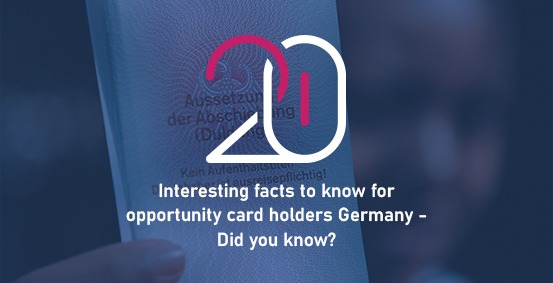
20 interesting facts to know for opportunity card holders Germany – Did you know?
The Opportunity Card in Germany is a program that allows software engineers to migrate to Germany and work there. Here are 20 interesting aspects of the program that software engineers might find useful:
- Germany has a high demand for software engineers, with over 36,000 job openings.
- The demand for software developers in Germany is expected to grow by 21% by 2025.
- Berlin has over 3,000 software engineer job openings.
- There are over 5,000 software developer job openings in Germany.
- The average salary for a software engineer in Germany is €60,000.
- The Opportunity Card allows software engineers to work in Germany for up to six months while looking for a job.
- The Opportunity Card is valid for up to 18 months.
- The Opportunity Card allows software engineers to work in any field, not just software engineering.
- The Opportunity Card allows software engineers to bring their families with them to Germany.
- Germany has a high standard of living and a strong social welfare system.
- Germany has a low unemployment rate, which means that software engineers are in high demand.
- Germany has a strong economy and is home to many successful companies.
- Germany has a high quality of life, with excellent healthcare and education systems.
- Germany is a diverse country with a rich culture and history.
- Germany is located in the heart of Europe, making it easy to travel to other countries.
- Germany has a strong startup ecosystem, with many opportunities for software engineers to work in startups.
- Germany has a strong focus on research and development, with many opportunities for software engineers to work in research.
- Germany has a strong engineering culture, with many opportunities for software engineers to work on cutting-edge technology.
- Germany has a high level of English proficiency, which makes it easy for English-speaking software engineers to work there.
- Germany has a strong work-life balance, with a maximum of 48 hours of work per week and a minimum of 20 days of paid vacation per year.
The opportunity card Germany – who is most likely to be interested?
The Germany opportunity card program is designed to attract skilled workers from outside the European Union, including software engineers. Here is what we know about the people who are most likely to be interested in migrating to Germany through the Chancenkarte program and their demographics:
- The program is open to non-EU residents who have the necessary qualifications for entry, such as language and professional skills, education level, and work experience.
- The program is particularly attractive to software engineers who are looking for job opportunities in Germany, as there is a high demand for software developers in the country.
- The program is also attractive to recent graduates of German universities who are looking to enter the labor market in Germany.
- The program is open to people of all ages, genders, and nationalities who meet the eligibility requirements.
- The program is designed to be family-friendly, allowing software engineers to bring their families with them to Germany.
- The program is particularly attractive to people who are looking for a high standard of living, a strong social welfare system, and a good work-life balance.
- The program is also attractive to people who are interested in living in a diverse country with a rich culture and history.
- The program is open to people who are interested in working in any field, not just software engineering.
- The program is particularly attractive to people who are interested in working in startups or in research and development.
- The program is open to people who are interested in living in a country with a strong economy and many successful companies.
- The program is particularly attractive to people who are interested in living in a country with a high level of English proficiency.
Overall, this program opportunity card Germany is designed to attract a diverse range of skilled workers, including software engineers, who are interested in living and working in Germany. The program is open to people of all ages, genders, and nationalities who meet the eligibility requirements and is particularly attractive to people who are looking for job opportunities in a country with a strong economy, a high standard of living, and a good work-life balance.




